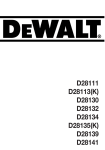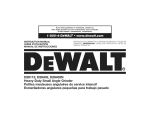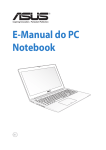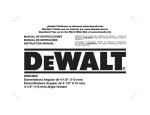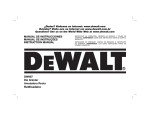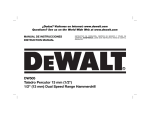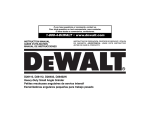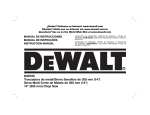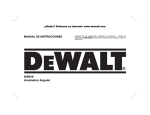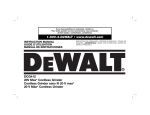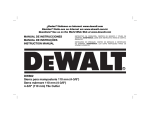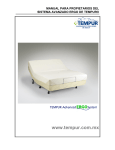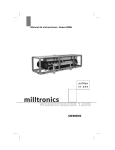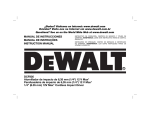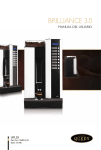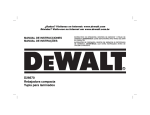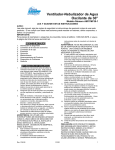Download N142324 man angle grinders D28111 LA Sp Eng.indd
Transcript
¿Dudas? Visítenos en Internet: www.dewalt.com Questions? See us on the World Wide Web at www.dewalt.com MANUAL DE INSTRUCCIONES INSTRUCTION MANUAL D28111, D28112 Esmeriladora Angular Angle Grinder INSTRUCTIVO DE OPERACIÓN, CENTROS DE SERVICIO Y PÓLIZA DE GARANTÍA. ADVERTENCIA: LÉASE ESTE INSTRUCTIVO ANTES DE USAR EL PRODUCTO. 1 Las siguientes definiciones describen el nivel de gravedad de cada advertencia. Lea el manual y preste atención a estos símbolos. PELIGRO: Indica una situación de peligro inminente que, si no se evita, provocará la muerte o lesiones graves. ADVERTENCIA: Indica una situación de peligro potencial que, si no se evita, podría provocar la muerte o lesiones graves. ATENCIÓN: Indica una situación de peligro potencial que, si no se evita, puede provocar lesiones leves o moderadas. AVISO: Se refiere a una práctica no relacionada a lesiones corporales que de no evitarse puede resultar en daños a la propiedad. 2) SEGURIDAD ELÉCTRICA a) Los enchufes de la herramienta eléctrica deben adaptarse a la toma de corriente. Nunca modifique el enchufe de ninguna manera. No utilice ningún enchufe adaptador con herramientas eléctricas con conexión a tierra. Los enchufes no modificados y que se adaptan a las tomas de corrientes reducirán el riesgo de descarga eléctrica. b) Evite el contacto corporal con superficies con toma de tierra como, por ejemplo, tuberías, radiadores, cocinas y refrigeradores. Existe mayor riesgo de descarga eléctrica si su cuerpo está puesto a tierra. c) No exponga las herramientas eléctricas a la lluvia ni a condiciones de humedad. Si entra agua en una herramienta eléctrica, aumentará el riesgo de descarga eléctrica. d) No use el cable indebidamente. Nunca utilice el cable para transportar, tirar o desenchufar la herramienta eléctrica. Mantenga el cable alejado del calor, el aceite, los bordes afilados o las piezas móviles. Los cables dañados o enredados aumentan el riesgo de descarga eléctrica. e) Al operar una herramienta eléctrica en el exterior, utilice un cable prolongador adecuado para tal uso. Utilice un cable adecuado para uso en exteriores a fin de reducir el riesgo de descarga eléctrica. ADVERTENCIA: para reducir el riesgo de lesiones, lea el manual de instrucciones. Advertencias generales de seguridad para las herramientas eléctricas ADVERTENCIA: Lea todas las advertencias de seguridad e instrucciones. El incumplimiento de las advertencias o instrucciones puede provocar descargas eléctricas, incendios o lesiones graves. GUARDE LAS ADVERTENCIAS E INSTRUCCIONES PARA PODER CONSULTARLAS EN EL FUTURO El término “herramienta eléctrica” incluido en todas las advertencias se refiere a su herramienta eléctrica conectada a la red (cable eléctrico) o a su herramienta eléctrica accionada con baterías (inalámbrica). 1 1 Español 1) SEGURIDAD DEL ÁREA DE TRABAJO a) Mantenga el área de trabajo limpia y bien iluminada. Las áreas abarrotadas u oscuras propician accidentes. b) No haga funcionar las herramientas eléctricas en atmósferas explosivas, como ambientes donde haya polvo, gases o líquidos inflamables. Las herramientas eléctricas originan chispas que pueden encender el polvo o producir humo. c) Mantenga alejados a los niños y a los espectadores de la herramienta eléctrica en funcionamiento. Las distracciones pueden provocar la pérdida de control. Definiciones: Normas de seguridad Español f) Use la vestimenta adecuada. No use ropas holgadas ni joyas. Mantenga el cabello, la ropa y los guantes alejados de las piezas en movimiento. Las ropas holgadas, las joyas o el cabello largo pueden quedar atrapados en las piezas en movimiento. g) Si se suministran dispositivos para la conexión de accesorios con fines de recolección y extracción de polvo, asegúrese de que estén conectados y que se utilicen correctamente. El uso del extractor de polvo puede reducir los riesgos relacionados con el polvo. f) Si no se puede evitar el uso de una herramienta eléctrica en una zona húmeda, utilice un dispositivo diferencial de seguridad. El uso de este dispositivo reduce el riesgo de sufrir una descarga eléctrica. 3) SEGURIDAD PERSONAL a) Permanezca alerta, controle lo que está haciendo y utilice el sentido común cuando emplee una herramienta eléctrica. No utilice una herramienta eléctrica si está cansado o bajo el efecto de drogas, alcohol o medicamentos. Un momento de descuido mientras se opera una herramienta eléctrica puede provocar lesiones personales graves. b) Utilice equipo de seguridad personal. Utilice siempre protección ocular. El uso de equipo de seguridad, como mascarillas para polvo, calzado de seguridad antideslizante, cascos o protección auditiva en las condiciones adecuadas reducirá las lesiones personales. c) Evite poner en marcha la herramienta involuntariamente. Asegúrese de que el interruptor está apagado antes de conectar la fuente de alimentación y/o la batería, coger o transportar la herramienta. Transportar herramientas eléctricas con su dedo apoyado sobre el interruptor o enchufar herramientas eléctricas con el interruptor en la posición de encendido puede propiciar accidentes. d) Retire la clavija de ajuste o la llave de tuercas antes de encender la herramienta eléctrica. Una llave de tuercas o una clavija de ajuste que quede conectada a una pieza giratoria de la herramienta eléctrica puede provocar lesiones personales. e) No se estire demasiado. Conserve el equilibrio y posiciónese adecuadamente en todo momento. Esto permite un mejor control de la herramienta eléctrica en situaciones inesperadas. 4) USO Y MANTENIMIENTO DE LA HERRAMIENTA ELÉCTRICA a) No fuerce la herramienta eléctrica. Utilice la herramienta eléctrica correcta para el trabajo que realizará. La herramienta eléctrica correcta hará el trabajo mejor, y de un modo más seguro, a la velocidad para la que fue diseñada. b) No utilice la herramienta eléctrica si no puede encenderla o apagarla con el interruptor. Las herramientas que no puedan ser controladas con el interruptor constituyen un peligro y deben repararse. c) Desconecte el enchufe de la fuente de alimentación o la batería de la herramienta eléctrica antes de realizar cualquier ajuste, cambio de accesorios o almacenar las herramientas eléctricas. Estas medidas de seguridad preventivas reducen el riesgo de encender la herramienta eléctrica de forma accidental. d) Guarde la herramienta eléctrica que no esté en uso fuera del alcance de los niños y no permita que otras personas no familiarizadas con ella o con estas instrucciones operen la herramienta. Las herramientas eléctricas son peligrosas si son operadas por usuarios que no tienen formación. 2 2 5) MANTENIMIENTO a) Solicite a una persona cualificada en reparaciones que realice el mantenimiento de su herramienta eléctrica y que solo utilice piezas de repuesto idénticas. Esto garantizará la seguridad de la herramienta eléctrica. NORMAS ESPECÍFICAS DE SEGURIDAD ADICIONALES Normas de seguridad adicionales • La esmeriladora se ha diseñado para el amolado y corte de mampostería y acero. ADVERTENCIA: No corte ni amole metales de poca densidad con un contenido en magnesio superior al 80%, ya que este tipo de metales son inflamables. 3 3 Español • No utilice accesorios distintos de las muelas y discos de corte reforzados con fibra. • Utilice exclusivamente muelas y discos de corte recomendados por el fabricante. • La velocidad máxima de la muela o del disco de corte debe ser siempre igual o superior a la velocidad en vacío impresa en la placa de características de la herramienta. • No corte piezas que requieran una profundidad máxima de corte superior a la del disco de corte. • No utilice muelas o discos de corte que no se ajusten a las dimensiones indicadas en la documentación técnica. No utilice espaciadores para encajar el disco en el eje. • Examine las muelas y los discos de corte antes de cada uso. No utilice discos desportillados, agrietados o con otros defectos. • Si dispone de ellos, utilice discos abrasivos al encajar el disco en el eje. • Cuando instale un disco con orificio roscado, asegúrese de que la rosca sea lo suficientemente larga para recibir el eje. • Compruebe que la muela o el disco de corte esté correctamente instalado antes del uso. • Ponga en marcha la herramienta sin carga en una posición segura durante 30 segundos como mínimo. Si se produce una vibración excesiva o existe algún otro defecto, pare la herramienta y examínela para descubrir la causa. • No utilice esta herramienta sin el protector en su sitio. • Compruebe que la pieza trabajada esté debidamente apoyada. • No utilice la herramienta cerca de líquidos inflamables, gases o residuos. Las chispas o astillas calientes procedentes de los cepillos mecánicos de corte o ruptura pueden prender los materiales combustibles. e) Mantenimiento de las herramientas eléctricas. Revise que no haya piezas en movimiento mal alineadas o trabadas, piezas rotas o cualquier otra situación que pueda afectar el funcionamiento de las herramientas eléctricas. Si encuentra daños, haga reparar la herramienta eléctrica antes de utilizarla. Se producen muchos accidentes a causa de las herramientas eléctricas que carecen de un mantenimiento adecuado. f) Mantenga las herramientas de corte afiladas y limpias. Las herramientas de corte con mantenimiento adecuado y con los bordes de corte afilados son menos propensas a trabarse y son más fáciles de controlar. g) Utilice las herramientas eléctricas, sus accesorios y piezas, etc. de acuerdo con las presentes instrucciones, teniendo siempre en cuenta las condiciones de trabajo y el trabajo que deba llevar a cabo. El uso de la herramienta eléctrica para operaciones diferentes de aquellas para las que fue diseñada podría originar una situación peligrosa. Español • No utilice la herramienta mientras se encuentre en línea con el disco. No permita que otras personas se acerquen el lugar de trabajo. • No utilice discos de corte para el amolado lateral. • No utilice el bloqueo del eje mientras la herramienta está en funcionamiento. • Tenga cuidado al apagar la herramienta, ya que la muela o disco seguirán girando durante un breve periodo. • Almacene siempre las muelas y los discos de corte en lugares secos. b) c) d) Causas del retroceso y su prevención por parte del operador El retroceso es una reacción repentina al pellizco o atascamiento de un disco giratorio, una almohadilla de respaldo, un cepillo o cualquier otro accesorio. El pellizco o el atascamiento hacen que el accesorio giratorio se trabe rápidamente, lo que a su vez provoca que la herramienta eléctrica fuera de control vaya en sentido opuesto al giro del accesorio en el punto del atascamiento. Por ejemplo, si la pieza de trabajo atasca o pellizca el disco abrasivo, el borde del disco que ingresa en el punto de pliegue puede clavarse en la superficie del material y provocar que el disco salte o se desenganche. El disco puede saltar hacia el operador o en sentido contrario, según la dirección del movimiento del disco en el punto de pellizco. Los discos abrasivos también se pueden romper en estas condiciones. El retroceso es el resultado de un mal uso de la herramienta o de condiciones o procedimientos operativos incorrectos y se puede evitar tomando las precauciones apropiadas que se indican a continuación: a) Sostenga la herramienta eléctrica con firmeza y ubique el cuerpo y el brazo para poder resistir las fuerzas de retroceso. Siempre utilice el mango lateral, en caso de e) tenerlo, para lograr el máximo control sobre el retroceso o la reacción de torsión durante el encendido. El operador puede controlar la reacción de torsión o las fuerzas de retroceso si toma las precauciones adecuadas. Nunca coloque la mano cerca del accesorio giratorio, ya que éste puede hacer un retroceso sobre la mano. No ubique el cuerpo en el área hacia donde la herramienta eléctrica se desplazará si se produce un retroceso. El retroceso impulsará la herramienta en la dirección opuesta al movimiento del disco en el punto de atascamiento. Tenga especial cuidado al trabajar en esquinas, bordes filosos, etc. Evite hacer rebotar o enganchar el accesorio. Las esquinas, los bordes filosos y el rebote tienden a enganchar el accesorio giratorio y producir la pérdida de control o el retroceso de la unidad. No conecte una hoja para carpintería para sierra de cadena ni una hoja de sierra dentada. Estas hojas puede producir el retroceso y la pérdida de control frecuentes. Advertencias de seguridad específicas para operaciones de esmerilado y cortes abrasivos a) Utilice sólo los tipos de disco recomendados para su herramienta eléctrica y el protector específico para el disco seleccionado. Los discos para los que la herramienta eléctrica no está diseñada no pueden protegerse adecuadamente y son inseguros. b) El protector debe fijarse en forma segura a la herramienta eléctrica y ubicarse para brindar la máxima seguridad, de manera que una mínima parte del disco quede expuesta hacia el operador. El protector ayuda a resguardar al operador de los fragmentos de discos rotos y el contacto accidental con el disco. 4 4 Advertencias de seguridad adicionales específicas para operaciones de corte abrasivo a) No “atasque” el disco de corte ni aplique una presión excesiva. No intente realizar una profundidad de corte excesiva. La sobrecarga de tensión sobre el disco aumenta la carga y la posibilidad de que el disco se tuerza o trabe durante el corte y se produzca un retroceso o la rotura del disco. b) No ubique el cuerpo en línea y detrás del disco giratorio. Cuando el disco, en funcionamiento, se aleja de su cuerpo, el posible retroceso puede despedir el disco giratorio y la herramienta eléctrica irá directamente hacia usted. c) Cuando el disco se atasque o deba interrumpir el corte por algún motivo, apague la herramienta eléctrica y manténgala inmóvil hasta que el disco se detenga completamente. Nunca intente retirar el disco del corte mientras está en movimiento, ya que se puede producir Advertencias de seguridad específicas para operaciones de lijado a) No utilice papel para disco de lijar con sobreespesor excesivo. Siga las recomendaciones del fabricante al seleccionar el papel de lija. Los papeles de lija más grandes que sobrepasan la almohadilla de lijado representan un peligro de laceración y pueden provocar el retroceso o que el disco se enganche o se rompa. Advertencias de seguridad específicas para operaciones de pulido a) No permita que ninguna parte desprendida de la capucha pulidora ni sus correas de sujeción giren libremente. 5 5 Español un retroceso. Investigue y tome las medidas correctivas para eliminar la causa del atascamiento del disco. d) No vuelva a iniciar la operación de corte en la pieza de trabajo. Deje que el disco alcance la velocidad máxima y vuelva a entrar cuidadosamente en el corte. El disco puede atascarse, saltarse del trabajo o producir un retroceso si la herramienta eléctrica se vuelve a encender dentro de la pieza de trabajo. e) Sostenga los paneles o cualquier pieza de trabajo con sobreespesor para minimizar el riesgo de que el disco se pellizque o se produzca un retroceso. Las piezas de trabajo grandes tienden a combarse por su propio peso. Los apoyos deben colocarse debajo de la pieza de trabajo, cerca de la línea de corte y cerca del borde de la pieza de trabajo, a ambos lados del disco. f) Sea muy cuidadoso cuando realice un “corte interno” en paredes existentes o en otras zonas ciegas. El disco que sobresale puede cortar cañerías de gas o agua, cables eléctricos u objetos que pueden producir un retroceso. c) Los discos sólo deben utilizarse para las aplicaciones recomendadas. Por ejemplo: no esmerile con el costado del disco de corte. Los discos para cortes abrasivos están diseñados para esmerilados periféricos, si se aplican fuerzas laterales a estos discos, pueden romperse. d) Siempre utilice bridas de disco en buen estado, con la forma y el tamaño apropiados para el disco seleccionado. Las bridas de disco adecuadas brindan soporte al disco, además de reducir la posibilidad de que el disco se rompa. Las bridas de los discos de corte pueden ser diferentes a las bridas de discos de esmerilado. e) No utilice discos desgastados de herramientas eléctricas más grandes. Los discos diseñados para herramientas eléctricas más grandes no son apropiados para la mayor velocidad de una herramienta más pequeña y pueden estallar. Español Oculte o corte cualquier correa de sujeción desprendida. Las correas de sujeción desprendidas y girando podrían atrapar sus dedos o engancharse en la pieza de trabajo. Tensión (Voltios) 120–127 V 220–240 V Corriente nominal (Amperios) 0–6 A 6–10 A 10–12 A 12–16 A Advertencias de seguridad específicas para operaciones de cepillado con cepillo de alambre a) Tenga en cuenta que las cerdas de alambre se desprenden del cepillo incluso durante el funcionamiento común. No sobrecargue los alambres al aplicar una carga excesiva al cepillo. Las cerdas de alambre pueden penetrar fácilmente la ropa liviana y la piel. b) Si se recomienda la utilización de un protector para el cepillado con cepillo de alambre, no permita ninguna interferencia entre el disco o cepillo de alambre y el protector. El disco o cepillo de alambre puede expandir su diámetro debido a las fuerzas centrífuga y de trabajo. Longitud del cable en metros (m) 0–7 7–15 15–30 30–50 0–15 15–30 30–60 60–100 Sección nominal mínima del cable en milímetros cuadrados (mm2) 1,0 1,0 1,5 2,5 1,5 1,5 1,5 4,0 1,5 2,5 2,5 4,0 2,5 4,0 No recomendado ADVERTENCIA: Si el enchufe o el cable de alimentación están dañados lo debe reemplazar el fabricante o su representante o por una persona igualmente calificada para evitar peligro. ADVERTENCIA: Use SIEMPRE lentes de seguridad. Los anteojos de diario NO SON lentes de seguridad. Utilice además una cubrebocas o mascarilla antipolvo si la operación de corte genera demasiado polvo. SIEMPRE LLEVE EQUIPO DE SEGURIDAD CERTIFICADO: • Protección ocular ANSI Z87.1 (CAN/CSA Z94.3), • Protección auditiva ANSI S12.6 (S3.19), • Protección respiratoria NIOSH/OSHA/MSHA. ADVERTENCIA: Parte del polvo generado al lijar, serrar, esmerilar y taladrar, así como al realizar otras actividades del sector de la construcción, contienen productos químicos que pueden producir cáncer, defectos congénitos u otras afecciones reproductivas. Algunos ejemplos de estos químicos son: • plomo de algunas pinturas en base a plomo, • polvo de sílice proveniente de ladrillos y cemento y otros productos de albañilería, y • arsénico y cromo provenientes de madera tratada químicamente. Advertencias de seguridad adicionales para esmeriladoras • Los orificios de ventilación suelen cubrir piezas en movimiento, por lo que también se deben evitar. Las piezas en movimiento pueden atrapar prendas de vestir sueltas, joyas o el cabello largo. • El cable de extensión deben ser de un calibre apropiado para su seguridad. Un cable de un calibre insuficiente causará una caída en la tensión de la línea dando por resultado una pérdida de energía y sobrecalentamiento. Cuando se utilice más de un alargador para completar el largo total, asegúrese que los hilos de cada alargador tengan el calibre mínimo. La tabla siguiente muestra el tamaño correcto a utilizar, dependiendo de la longitud del cable y del amperaje nominal de la placa de identificación. Si tiene dudas sobre cuál calibre usar, use un calibre mayor 6 6 GUARDE ESTAS INSTRUCCIONES PARA VOLVER A CONSULTAR EN EL FUTURO Motor Verifique que su abastecimiento de energía concuerda con lo indicado en la placa de identificación. Disminuciones en el voltaje mayores a 10% provocarán la pérdida de potencia y sobre calentamiento. DEWALT realiza pruebas de fábrica en todas sus herramientas; si su herramienta no funciona la línea de alimentación. COMPONENTES (Fig. 1) ADVERTENCIA: Nunca modifique la herramienta eléctrica, ni tampoco ninguna de sus piezas. Podría producir lesiones corporales o daños. 7 7 Español producirse un movimiento repentino y violento de la herramienta si el disco u otro accesorio entra en contacto con una segunda superficie o un borde. • La etiqueta de su herramienta puede incluir los siguientes símbolos. Los símbolos y sus definiciones son los siguientes: V ..........voltios A ........... amperios Hz ........hertz W .......... vatios ........ corriente alterna min ......minutos no ......... velocidad sin carga ....corriente directa ........Construcción Clase I .......... terminal a tierra ......... símbolo de alerta de (con conexión a tierra) .........Construcción Clase II seguridad (con aislamiento doble) …/min ... revoluciones o BPM ....golpes por minuto reciprocidad por sfpm ....pies superficies por minuto ............. minuto IPM....... impactos por minuto Su riesgo de exposición a estos químicos varía, dependiendo de la frecuencia con la cual realiza usted este tipo de trabajo. Para reducir su exposición a estas sustancias químicas: trabaje en una zona bien ventilada y llevando equipos de seguridad aprobados, como mascarillas antipolvo especialmente diseñadas para filtrar partículas microscópicas. • Evite el contacto prolongado con polvo generado por el lijado, aserrado, pulido, taladrado y otras actividades de construcción. Vista ropas protectoras y lave las áreas de la piel expuestas con agua y jabón. Si permite que el polvo se introduzca en la boca u ojos o quede sobre la piel, puede favorecer la absorción de productos químicos peligrosos. ADVERTENCIA: La utilización de esta herramienta puede generar polvo o dispersarlo, lo que podría causar daños graves y permanentes al sistema respiratorio, así como otras lesiones. Siempre use protección respiratoria aprobada por NIOSH (Instituto Nacional de Seguridad y Salud en el Trabajo) u OSHA (Administración de Seguridad y Salud en el Trabajo) apropiada para la exposición al polvo. Dirija las partículas en dirección contraria a la cara y el cuerpo. ADVERTENCIA: Siempre lleve la debida protección auditiva personal en conformidad con ANSI S12.6 (S3.19) durante el uso de esta herramienta. Bajo algunas condiciones y duraciones de uso, el ruido producido por este producto puede contribuir a la pérdida auditiva. ADVERTENCIA: Utilice siempre protección para los ojos. Todos los usuarios y espectadores deben utilizar protección para los ojos conforme con las normas ANSI Z87.1. ADVERTENCIA: Cuando no la utilice, coloque la esmeriladora en una superficie estable donde no pueda moverse de manera accidental, deslizarse ni provocar tropezones o caídas. Puede causar lesiones personales graves. ATENCIÓN: Para reducir el riesgo de lesiones personales, tenga mucho cuidado al trabajar en una esquina o borde, ya que puede Español A. Interruptor de marcha/parada B. Traba del eje C. Guarda con llave D. Empuñadura lateral Características (D28112) EMPUÑADURA LATERAL ANTIVIBRACIÓN La empuñadura lateral antivibración ofrece una comodidad adicional absorbiendo las vibraciones provacadas por la herramienta. USO PREVISTO La esmeriladora angular de alto rendimiento fue diseñada para aplicaciones demandantes, por ejemplo obras de construcción. NO use la herramienta bajo condiciones de humedad o en presencia de gases o líquidos inflamables. NO utilice otras muelas o discos que las de centro deprimido y discos con protección. Estas esmeriladoras de alto rendimiento son herramientas profesionales. NO permita que los niños tengan contacto con la herramienta. Cuando la hagan funcionar operarios sin experiencia, es necesaria su supervisión. PROTECTOR SIN LLAVE El protector sin llave permite un ajuste rápido durante la aplicación para aumentar la versatilidad de la misma. SISTEMA DE EYECCIÓN DE POLVO El sistema de eyección de polvo evita la acumulación de polva alrededor del protector y la entrada del motor, al tiempo que minimiza la cantidad de polvo que penetra en el alojamiento del motor. Accesorios FIG. 1 Es importante seleccionar los protectores, las almohadillas de respaldo y las bridas correctos a utilizar con los accesorios de la esmeriladora. Consulte la Tabla de accesorios de amolado y corte al final de esta sección que muestra otros accesorios que pueden utilizarse con estas esmeriladoras. ADVERTENCIA: Los accesorios deben estar clasificados para la velocidad recomendada en la etiqueta de advertencia de la herramienta, como mínimo. Los discos y otros accesorios que funcionen por encima de su velocidad nominal pueden desarmarse y provocar lesiones. Los accesorios roscados deben tener un cubo de 5/8"-11 ou M-14. De no ser así, puede estar diseñado para una sierra circular. Utilice sólo los accesorios que se muestran en la Tabla de accesorios de amolado y corte al final de esta sección. La velocidad nominal de los accesorios debe ser siempre superior a la velocidad de la herramienta, indicada en la placa de ésta. A D B C 8 8 4. Apriete firmemente el tornillo (H). 5. Para retirar el protector, afloje el tornillo. MONTAJE Y AJUSTES FIG. 2 C F Protector con tornillo de fijación (Fig. 2A, 2B) G ADVERTENCIA: Para minimizar el riesgo de graves lesiones personales, apague la herramienta antes de realizar ajustes o quitar/instalar los acoples o accesorios. Un encendido accidental puede causar lesiones. Un arranque accidental podría causar lesiones. Cuando utilice la esmeriladora D28111, D28113, D28130, D28132C, D28134, D28135, D28139 o D28141 para cortar metal o mampostería DEBE usarse un protector Tipo 1. Los protectores Tipo 1 pueden obtenerse por un precio adicional de los distribuidores de DeWALT. NOTA: Consulte la Tabla de accesorios de amolado y corte al final de esta sección que muestra otros accesorios que pueden utilizarse con estas esmeriladoras. H G D28112 1. Abra el cerrojo del protector (E) y alinee las lengüetas (F) del protector con las ranuras de la caja de engranajes (G). Esto alineará las lengüetas del protector con las ranuras de la cubierta de la caja de engranajes. 2. Empuje el protector hacia abajo hasta que las lengüetas del protector enganchen y giren libremente en la ranura del cubo de la caja de engranajes. 3. Con el cerrojo del protector abierto, gire el protector (C) hasta la posición de trabajo deseada. El cuerpo del protector debe quedar colocado entre el eje y el operador, para proveer la máxima protección al operador. D28111 1. Alinee las lengüetas (F) del protector con las ranuras de la caja de engranajes (G). Esto alineará las lengüetas del protector con las ranuras de la cubierta de la caja de engranajes. 2. Empuje el protector hacia abajo hasta que las lengüetas del protector enganchen y giren libremente en la ranura del cubo de la caja de engranajes. 3. Gire el protector (C) hasta la posición de trabajo deseada. El cuerpo del protector debe quedar colocado entre el eje y el operador, para proveer la máxima protección al operador. 9 Español ADVERTENCIA: Para minimizar el riesgo de graves lesiones personales, apague la herramienta antes de realizar ajustes o quitar/instalar los acoples o accesorios. Un encendido accidental puede causar lesiones. Un arranque accidental podría causar lesiones. ADVERTENCIA: Nunca utilice la herramienta sin el protector colocado en su lugar. lesiones personales, lleve la herramienta y el protector a un centro de servicios para que reparen o remplacen el protector. FIG. 2B Español C FIG. 3A M M F K L E O FIG. 3B I J A G K I G J M K I 4. Cierre el cerrojo del protector para asegurarlo a la caja de engranajes. No se debe poder girar el protector manualmente cuando el cerrojo está cerrado. No haga funcionar la esmeriladora con un protector flojo o con la palanca de la abrazadera en la posición de abierta. 5. Para retirar el protector, abra el cerrojo del protector, gire el protector para que las flechas se alineen y tire del protector. NOTA: El protector está ajustado en fábrica para el diámetro del cubo de la caja de engranajes. Si, después de un tiempo, el protector se afloja, apriete el tornillo de ajuste (O) con la palanca de la abrazadera en la posición de cerrada y el protector instalado en la herramienta. ATENCIÓN: No apriete el tornillo de ajuste con la palanca de la abrazadera en la posición de abierta. Puede producir un daño indetectable al protector o al cubo de montaje. ATENCIÓN: Si no se puede apretar el protector ajustando la abrazadera, no utilice la herramienta. Para reducir el riesgo de J B Montaje y Desmontaje de un Disco de Esmerilado o De Corte (Fig. 1, 3A, 3B) 1. Coloque la herramienta en una mesa, con el protector hacia arriba. 2. Fije la brida interior (I) correctamente en el eje (J) (fig. 3A). 3. Coloque el disco (K) sobre la eje (I). Cuando instale un disco con el centro elevado, asegúrese de que el centro elevado (L) quede hacia la brida (I). 10 FUNCIONAMIENTO ADVERTENCIA: Deje que la herramienta alcance su velocidad total antes de tocar con ella la superficie de la pieza de trabajo. Levante la herramienta de la superficie de trabajo antes de apagarla. ADVERTENCIA: Asegúrese de que todos los materiales que se vayan a esmerilar o cortar estén sujetos en su posición. ADVERTENCIA: Sólo se debe ejercer una ligera presión sobre la herramienta. No ejerza presión lateral sobre el disco. ADVERTENCIA: Evite la sobrecarga. En caso de calentamiento de la herramienta, hágala funcionar unos minutos sin carga. ADVERTENCIA: Para minimizar el riesgo de graves lesiones personales, apague la herramienta antes de realizar ajustes o quitar/instalar los acoples o accesorios. Un encendido accidental puede causar lesiones. Un arranque accidental podría causar lesiones. Montaje de la empuñadura lateral (Fig. 4) Atornille la empuñadura lateral (D) firmemente en uno de los orificios (N) de cualquiera de los lados de la caja de engranajes. ANTES DE TRABAJAR Montar el protector adecuado y un disco o una muela. No use discos o muelas excesivamente desgastados. Asegúrese de que los ejes interior y exterior estén correctamente instaladas. Asegúrese de que el disco o la muela gira en el sentido indicado por las flechas en el accesorio y la herramienta. FIG. 4 N N Encendido y apagado (Fig. 1) D Para poner en marcha la herramienta, presione el interruptor de encendido/apagado (A). Para trabajar de manera continua, presione el interruptor de encendido/apagado hacia delante. Para parar la herramienta, suelte el interrptor. Para parar la herramienta en mode de funcionamiento continuo, presione sobre la parte trasera del interruptor. 11 Español 4 Enrosque la brida exterior (M) en el eje (J) (fig. 3B): – el aro del eje (M) debe quedar hacia el disco cuando se instala un disco de esmerilar (K); – el aro del eje (M) debe quedar al lado contrario del disco cuando se instala un disco de corte (K). 5. Presione el bloqueo del eje (B) y haga girar el eje (J) hasta que encaje en su posición. 6. Apriete el eje (M) con la llave doble para tuercas suministrada. 7. Suelte el bloqueo del eje. 8. Para retirar el disco, afloje el eje (M) con la llave doble para tuercas. ADVERTENCIA: No utilice el disco si está dañado. Su herramienta DEWALT ha sido diseñada para funcionar durante un largo período con un mínimo de mantenimiento. Un funcionamiento continuo satisfactorio depende del cuidado adecuado de la herramienta y de una limpieza periódica. Español ADVERTENCIA: No encienda ni apague la herramienta cuando esté con carga. Aplicaciones metálicas Cuando utilice la herramienta en aplicaciones metálicas, asegúrese de insertar un dispositivo de corriente residual (RCD) para evitar los riesgos residuales provocados por el polvo metálico. Si el RCD desconecta el suministro eléctrico, lleve la herramienta a un servicio técnico autorizado de DEWALT. ADVERTENCIA: En condiciones de trabajo extremas, el polvo conductor puede acumularse en el interior del alojamiento de la máquina al trabajar con metal. Esto puede hacer que el aislamiento protector de la máquina se degrade con el riesgo potencial de una descarga eléctrica. ADVERTENCIA: Para evitar la acumulación de polvo metálico en el interior de la máquina, le recomendamos que limpie las ranuras de ventilación diariamente. Consulte Mantenimiento. Desgaste de carbones El motor se apagará automáticamente indicando que los carbones están casi desgastadas y que la herramienta necesita mantenimiento. Los carbones no pueden ser sustituidas por el usuario. Confíe la herramienta al servicio técnico autorizado DEWALT. Lubricación La herramienta eléctrica no requiere lubricación adicional. Limpieza ADVERTENCIA: Acumulación de polvo metálico. El uso abundante de discos laminados en aplicaciones metálicas puede provocar el aumento del potencial de descarga eléctrica. Para reducir este riesgo, inserte un dispositivo de corriente residual (RCD) antes del uso y limpie las ranuras de ventilación diariamente, soplando con aire comprimido en las ranuras según las siguientes instrucciones de mantenimiento. ADVERTENCIA: Sople la suciedad y el polvo de todos los conductos de ventilación con aire seco al menos una vez por semana. Utilice la protección adecuada para los ojos ANSI Z87.1 (CAN/CSA Z94.3) y la protección respiratoria adecuada NIOSH/ OSHA/MSHA cuando realice esta operación. ADVERTENCIA: Nunca utilice disolventes u otros productos químicos abrasivos para limpiar las piezas no metálicas de la herramienta. Estos productos químicos pueden debilitar los materiales plásticos utilizados en estas piezas. Utilice un paño humedecido sólo con agua y jabón neutro. Nunca permita que penetre líquido dentro de la herramienta y nunca sumerja las piezas de la herramienta en un líquido. MANTENIMIENTO Compra de accesorios ADVERTENCIA: Para minimizar el riesgo de graves lesiones personales, apague la herramienta antes de realizar ajustes o quitar/instalar los acoples o accesorios. Un encendido accidental puede causar lesiones. Un arranque accidental podría causar lesiones. ADVERTENCIA: Dado que algunos accesorios, diferentes de los ofrecidos por DEWALT, no se han probado con este producto, el empleo de tales accesorios podría constituir un riesgo. Para reducir el riesgo de lesiones, sólo deben usarse con el producto los accesorios recomendados DEWALT. Uso de discos laminados 12 Español Si desea más información sobre los accesorios adecuados, consulte a su distribuidor. ADVERTENCIA: Para reducir el riesgo de lesiones, use SIEMPRE las protecciones adecuadas al esmerilar y gafas protectoras. Reparaciones Para garantizar la SEGURIDAD y la CONFIABILIDAD, deberán hacerse reparaciones, mantenimiento y ajustes de esta herramienta en los centros autorizados de servicio DEWALT u otras organizaciones autorizadas. Estas organizaciones prestan servicio a las herramientas DEWALT y emplean siempre refacciones legitimas DEWALT. Protección del Medio Ambiente No deseche este producto con la basura normal del hogar o sitio de trabajo. Si llegase el día en que su producto DEWALT necesita reemplazo, o si no es de utilidad para usted, no lo deseche junto con otros residuos. Este producto puede ser reciclado para prevenir la contaminación del medio ambiente y reducir la demanda de materias primas. Le sugerimos llevar el producto a un centro de servicio autorizado DEWALT o a un centro de reciclaje, donde expertos podrán reciclar y reutilizar los materiales. Revise las normativas locales para reciclaje de productos eléctricos tales como herramientas y electrodomésticos, allí podrá encontrar centros de reciclaje municipales. 13 Español ESPECIFICACIONES Potencia Frecuencia Velocidad Eje D28111-AR 850 W 50 Hz 10000 / min M14 D28111-B2 850 W 50-60 Hz 10000 / min M14 14 D28111-B3 850 W 50-60 Hz 10000 / min 5/8-11 D28112-AR 1100 W 50 Hz 11000 / min M14 D28112-B2 1100 W 50-60 Hz 11000 / min M14 TABLA DE ACCESORIOS PARA ESMERILAR GUARDA TIPO 27 Accesorio Descripción Disco para esmerilar con centro deprimido Guarda Tipo 27 Disco con aletas Flange Disco de alambre Tipo de guarda Cómo colocar la esmeriladora GUARDA TIPO 27 Descripción Copa de alambre con tuerca roscada Cómo colocar la esmeriladora Guarda Tipo 27 Cepillo de alambre Plato portadiscos/ hoja de lijado Disco con centro deprimido Tipo 27 Guarda Tipo 27 Respaldo de goma Tuerca de presión roscada Disco de alambre con tuerca roscada Accesorio Disco para lijar Guarda Tipo 27 Tuerca de presión roscada Rueda de alambre 15 Español Tipo de guarda Español TABLA DE ACCESORIOS PARA ESMERILAR (cont.) Tipo de guarda Accesorio Descripción Cómo colocar la esmeriladora Disco de corte para mampostería GUARDA TIPO 1 Guarda Tipo 1 Disco de corte para metal Flange Disco diamantado para cortar Disco de corte Tuerca de presión roscada SIN GUARDA Bonete para pulir 16 c) Keep children and bystanders away while operating a power tool. Distractions can cause you to lose control. Definitions: Safety Guidelines The definitions below describe the level of severity for each signal word. Please read the manual and pay attention to these symbols. DANGER: Indicates an imminently hazardous situation which, if not avoided, will result in death or serious injury. WARNING: Indicates a potentially hazardous situation which, if not avoided, could result in death or serious injury. CAUTION: Indicates a potentially hazardous situation which, if not avoided, may result in minor or moderate injury. NOTICE: indicates a practice not related to personal injury which, if not avoided, may result in property damage. 2) ELECTRICAL SAFETY a) Power tool plugs must match the outlet. Never modify the plug in any way. Do not use any adapter plugs with earthed (grounded) power tools. Unmodified plugs and matching outlets will reduce risk of electric shock. b) Avoid body contact with earthed or grounded surfaces such as pipes, radiators, ranges and refrigerators. There is an increased risk of electric shock if your body is earthed or grounded. c) Do not expose power tools to rain or wet conditions. Water entering a power tool will increase the risk of electric shock. d) Do not abuse the cord. Never use the cord for carrying, pulling or unplugging the power tool. Keep cord away from heat, oil, sharp edges or moving parts. Damaged or entangled cords increase the risk of electric shock. e) When operating a power tool outdoors, use an extension cord suitable for outdoor use. Use of a cord suitable for outdoor use reduces the risk of electric shock. f) If operating a power tool in a damp location is unavoidable, use a residual current device (RCD) protected supply. Use of an RCD reduces the risk of electric shock. WARNING: To reduce the risk of injury, read the instruction manual. General Power Tool Safety Warnings WARNING! Read all safety warnings and all instructions Failure to follow the warnings and instructions may result in electric shock, fire and/or serious injury. SAVE ALL WARNINGS AND INSTRUCTIONS FOR FUTURE REFERENCE 3) PERSONAL SAFETY a) Stay alert, watch what you are doing and use common sense when operating a power tool. Do not use a power tool while you are tired or under the influence of drugs, alcohol or medication. A moment of inattention while operating power tools may result in serious personal injury. b) Use personal protective equipment. Always wear eye protection. Protective equipment such as dust mask, nonskid safety shoes, hard hat, or hearing protection used for appropriate conditions will reduce personal injuries. 1) WORK AREA SAFETY a) Keep work area clean and well lit. Cluttered or dark areas invite accidents. b) Do not operate power tools in explosive atmospheres, such as in the presence of flammable liquids, gases or dust. Power tools create sparks which may ignite the dust or fumes. 17 English The term “power tool”in the warnings refers to your mains-operated (corded) power tool or battery-operated (cordless) power tool. d) Store idle power tools out of the reach of children and do not allow persons unfamiliar with the power tool or these instructions to operate the power tool. Power tools are dangerous in the hands of untrained users. e) Maintain power tools. Check for misalignment or binding of moving parts, breakage of parts and any other condition that may affect the power tool’s operation. If damaged, have the power tool repaired before use. Many accidents are caused by poorly maintained power tools. f) Keep cutting tools sharp and clean. Properly maintained cutting tools with sharp cutting edges are less likely to bind and are easier to control. g) Use the power tool, accessories and tool bits etc., in accordance with these instructions taking into account the working conditions and the work to be performed. Use of the power tool for operations different from those intended could result in a hazardous situation. English c) Prevent unintentional starting. Ensure the switch is in the off position before connecting to power source and/ or battery pack, picking up or carrying the tool. Carrying power tools with your finger on the switch or energising power tools that have the switch on invites accidents. d) Remove any adjusting key or wrench before turning the power tool on. A wrench or a key left attached to a rotating part of the power tool may result in personal injury. e) Do not overreach. Keep proper footing and balance at all times. This enables better control of the power tool in unexpected situations. f) Dress properly. Do not wear loose clothing or jewellery. Keep your hair, clothing and gloves away from moving parts. Loose clothes, jewellery or long hair can be caught in moving parts. g) If devices are provided for the connection of dust extraction and collection facilities, ensure these are connected and properly used. Use of dust collection can reduce dust-related hazards. 5) SERVICE a) Have your power tool serviced by a qualified repair person using only identical replacement parts. This will ensure that the safety of the power tool is maintained. 4) POWER TOOL USE AND CARE a) Do not force the power tool. Use the correct power tool for your application. The correct power tool will do the job better and safer at the rate for which it was designed. b) Do not use the power tool if the switch does not turn it on and off. Any power tool that cannot be controlled with the switch is dangerous and must be repaired. c) Disconnect the plug from the power source and/or the battery pack from the power tool before making any adjustments, changing accessories, or storing power tools. Such preventive safety measures reduce the risk of starting the power tool accidentally. ADDITIONAL SPECIFIC SAFETY RULES Additional safety rules for grinders • Your grinder has been designed for grinding and cutting masonry and steel. WARNING: Do not cut or grind light metal with a magnesium content exceeding 80% since this type of metal is flammable. • Do not use any accessories other than fibre reinforced grinding and cutting discs. • Use the grinding and cutting discs recommended by the manufacturer only. 18 • The max. allowable speed of the grinding wheel or cutting disc must always be equal to or greater than the no-load speed of the tool specified on the nameplate. • Do not cut workpieces requiring a maximum depth of cut exceeding that of the cutting disc. • Do not use grinding and cutting discs that do not conform to the dimensions stated in the technical data. Do not use any spacers to make a disc fit onto the spindle. • Inspect grinding and cutting discs before each use. Do not use chipped, cracked or otherwise defective discs. • If provided, ensure that blotters are used when the disc is fitted onto the spindle. • When applying a threaded hole disc, ensure that the thread is long enough to accept the spindle. • Ensure that the grinding or cutting disc is mounted correctly before use. • Let the tool run at no-load in a safe position for at least 30 seconds. If there is a considerable vibration or if any other defect occurs, stop the tool and check it to determine the cause. • Do not operate this tool without the guard in place. • Check that the workpiece is properly supported. • Do not operate the tool near flammable liquids, gases or dust. Sparks or hot chips from cutting or arcing motor brushes may ignite combustible materials. • Do not operate the tool while standing in line with the disc. Keep other persons away from the work area. • Do not use cutting discs for side grinding. • Do not operate the spindle lock while the tool is running. • Beware that after switching off the tool the wheel continues to rotate for a short period. • Always store grinding and cutting discs in a dry place. Causes and Operator Prevention of Kickback 19 English Kickback is a sudden reaction to a pinched or snagged rotating wheel, backing pad, brush or any other accessory. Pinching or snagging causes rapid stalling of the rotating accessory which in turn causes the uncontrolled power tool to be forced in the direction opposite of the accessory’s rotation at the point of the binding. For example, if an abrasive wheel is snagged or pinched by the workpiece, the edge of the wheel that is entering into the pinch point can dig into the surface of the material causing the wheel to climb out or kick out. The wheel may either jump toward or away from the operator, depending on direction of the wheel’s movement at the point of pinching. Abrasive wheels may also break under these conditions. Kickback is the result of tool misuse and/or incorrect operating procedures or conditions and can be avoided by taking proper precautions as given below: a) Maintain a firm grip on the power tool and position your body and arm to allow you to resist kickback forces. Always use auxiliary handle, if provided, for maximum control over kickback or torque reaction during start up. The operator can control torque reaction or kickback forces, if proper precautions are taken. b) Never place your hand near the rotating accessory. Accessory may kickback over your hand. c) Do not position your body in the area where power tool will move if kickback occurs. Kickback will propel the tool in direction opposite to the wheel’s movement at the point of snagging. d) Use special care when working corners, sharp edges etc. Avoid bouncing and snagging the accessory. Corners, sharp edges or bouncing have a tendency to snag the rotating accessory and cause loss of control or kickback. b) Do not position your body in line with and behind the rotating wheel. When the wheel, at the point of operation, is moving away from your body, the possible kickback may propel the spinning wheel and the power tool directly at you. c) When wheel is binding or when interrupting a cut for any reason, switch off the power tool and hold the power tool motionless until the wheel comes to a complete stop. Never attempt to remove the cut-off wheel from the cut while the wheel is in motion otherwise kickback may occur. Investigate and take corrective action to eliminate the cause of wheel binding. d) Do not restart the cutting operation in the workpiece. Let the wheel reach full speed and carefully reenter the cut. The wheel may bind, walk up or kickback if the power tool is restarted in the workpiece. e) Support panels or any oversized workpiece to minimize the risk of wheel pinching and kickback. Large workpieces tend to sag under their own weight. Supports must be placed under the workpiece near the line of cut and near the edge of the workpiece on both sides of the wheel. f) Use extra caution when making a “pocket cut” into existing walls or other blind areas. The protruding wheel may cut gas or water pipes, electrical wiring or objects that can cause kickback. e) Do not attach a saw chain woodcarving blade or toothed saw blade. Such blades create frequent kickback and loss of control. Safety Warnings Specific for Grinding and Abrasive Cutting-Off Operations English a) Use only wheel types that are recommended for your power tool and the specific guard designed for the selected wheel. Wheels for which the power tool was not designed cannot be adequately guarded and are unsafe. b) The guard must be securely attached to the power tool and positioned for maximum safety, so the least amount of wheel is exposed towards the operator. The guard helps to protect operator from broken wheel fragments and accidental contact with wheel. c) Wheels must be used only for recommended applications. For example: do not grind with the side of cut-off wheel. Abrasive cut-off wheels are intended for peripheral grinding, side forces applied to these wheels may cause them to shatter. d) Always use undamaged wheel flanges that are of correct size and shape for your selected wheel. Proper wheel flanges support the wheel thus reducing the possibility of wheel breakage. Flanges for cut-off wheels may be different from grinding wheel flanges. e) Do not use worn down wheels from larger power tools. Wheel intended for larger power tool is not suitable for the higher speed of a smaller tool and may burst. Safety Warnings Specific for Sanding Operations Additional Safety Warnings Specific for Abrasive Cutting-Off Operations a) Do not use excessively oversized sanding disc paper. Follow manufacturers recommendations, when selecting sanding paper. Larger sanding paper extending beyond the sanding pad presents a laceration hazard and may cause snagging, tearing of the disc or kickback. a) Do not “jam” the cut-off wheel or apply excessive pressure. Do not attempt to make an excessive depth of cut. Overstressing the wheel increases the loading and susceptibility to twisting or binding of the wheel in the cut and the possibility of kickback or wheel breakage. 20 Safety Warnings Specific for Polishing Operations Voltage (Volts) 120–127V 220–240V a) Do not allow any loose portion of the polishing bonnet or its attachment strings to spin freely. Tuck away or trim any loose attachment strings. Loose and spinning attachment strings can entangle your fingers or snag on the workpiece. Rated Ampere range 0–6A 6–10A 10–12A 12–16A Safety Warnings Specific for Wire Brushing Operations a) Be aware that wire bristles are thrown by the brush even during ordinary operation. Do not overstress the wires by applying excessive load to the brush. The wire bristles can easily penetrate light clothing and/or skin. b) If the use of a guard is recommended for wire brushing, do not allow any interference of the wire wheel or brush with the guard. Wire wheel or brush may expand in diameter due to work and centrifugal forces. Total length of cord in meters (m) 0–7 0–15 7–15 15–30 15–30 30–60 30–50 60–100 Minimal cross-sectional area of the cord in meters (mm2 ) 1.0 1.5 1.5 2.5 1.0 1.5 2.5 4.0 1.5 1.5 2.5 4.0 2.5 4.0 Not Recommended Additional Safety Warnings for Grinders • Air vents often cover moving parts and should be avoided. Loose clothes, jewelry or long hair can be caught in moving parts. • An extension cord must have adequate wire size for safety. An undersized cord will cause a drop in line voltage resulting in loss of power and overheating. When using more than one extension to make up the total length, be sure each individual extension contains at least the minimum wire size. The following table shows the correct size to use depending on cord length and nameplate ampere rating. If in doubt, use the next heavier gauge. The smaller the gauge number, the heavier the cord. 21 English WARNING: ALWAYS USE SAFETY GLASSES. Everyday eyeglasses are NOT safety glasses. Also use face or dust mask if cutting operation is dusty. All users and bystanders MUST ALWAYS wear certified safety equipment: • ANSI Z87.1 eye protection (CAN/CSA Z94.3), • ANSI S12.6 (S3.19) hearing protection, • NIOSH/OSHA/MSHA respiratory protection. WARNING: Some dust created by power sanding, sawing, grinding, drilling, and other construction activities contains chemicals known to cause cancer, birth defects or other reproductive harm. Some examples of these chemicals are: • lead from lead-based paints, • crystalline silica from bricks and cement and other masonry products, and • arsenic and chromium from chemically-treated lumber. Your risk from these exposures varies, depending on how often you do this type of work. To reduce your exposure to these chemicals: work in a well ventilated area, and work with approved safety equipment, such as those dust masks that are specially designed to filter out microscopic particles. English …/min . per minute IPM ...... impacts per minute • Avoid prolonged contact with dust from power sanding, sawing, grinding, drilling, and other construction activities. Wear protective clothing and wash exposed areas with soap and water. Allowing dust to get into your mouth, eyes, or lay on the skin may promote absorption of harmful chemicals. WARNING: Use of this tool can generate and/or disburse dust, which may cause serious and permanent respiratory or other injury. Always use NIOSH/OSHA approved respiratory protection appropriate for the dust exposure. Direct particles away from face and body. WARNING: Always wear proper personal hearing protection that conforms to ANSI S12.6 (S3.19) during use. Under some conditions and duration of use, noise from this product may contribute to hearing loss. WARNING: Always use eye protection. All users and bystanders must wear eye protection that conforms to ANSI Z87.1. WARNING: When not in use, place grinder on a stable surface where it will not move inadvertantly, roll or cause a tripping or falling hazard. Serious personal injury may result. CAUTION: To reduce the risk of personal injury, use extra care when working into a corner or edge because a sudden, sharp movement of the tool may be experienced when the wheel or other accessory contacts a secondary surface or a surface edge. • The label on your tool may include the following symbols. The symbols and their definitions are as follows: V .......... volts A.......... amperes Hz ........ hertz W......... watts ....... alternating current min ...... minutes ... direct current ....... alternating or direct current ........ Class I Construction no ........ no load speed ............ (grounded) ........ earthing terminal ........ Class II Construction ......... safety alert symbol ............ (double insulated) BPM .... beats per minute RPM .... revolutions per minute sfpm .... surface feet per minute SAVE THESE INSTRUCTIONS FOR FUTURE USE Motor Be sure your power supply agrees with the nameplate marking. Voltage decrease of more than 10% will cause loss of power and overheating. All DEWALT tools are factory tested; if this tool does not operate, check the power supply. DESCRIPTION (FIG. 1) WARNING: Never modify the power tool or any part of it. Damage or personal injury could result. A. On/Off switch C. Guard B. Spindle Lock D. Side Handle INTENDED USE Your angle grinder has been designed for professional grinding and cutting applications. DO NOT use under wet conditions or in presence of flammable liquids or gases. DO NOT use grinding wheels other than center depressed wheels and flap-disk. This heavy-duty angle grinder is a professional power tool. DO NOT let children come into contact with the tool. Supervision is required when inexperienced operators use this tool. 22 Accessories FIG. 1 It is important to choose the correct guards, backing pads and flanges to use with grinder accessories. NOTE: Please refer to the Grinding and Cutting Accessory Chart at the end of this section to show other accessories that can be used with these grinders. WARNING: Accessories must be rated for at least the speed recommended on the tool warning label. Wheels and other accessories running over their rated accessory speed may fly apart and cause injury. Threaded accessories must have a 5/8"-11 or M-14 hub. If it does not, it may have been designed for a circular saw. Use only the accessories shown on the Grinding and Cutting Accessory Chart at the end of this section. Accessory ratings must always be above tool speed as shown on tool nameplate. A D ASSEMBLY AND ADJUSTMENTS B WARNING: To reduce the risk of injury, turn unit off and disconnect tool from power source before installing and removing accessories, before making any adjustments or removing/installing attachments or accessories. An accidental start-up can cause injury. C WARNING: Never use the tool without the guard in place. Features (D28112) Mounting and Removing the Guard (Fig. 2A, 2B) ANTI-VIBRATION SIDE HANDLE The anti-vibration side handle offers added comfort by absorbing the vibrations caused by the tool. KEYLESS GUARD The keyless guard allows for quick adjustment during the application to enhance application versatility. DUST EJECTION SYSTEM The dust ejection system prevents dust pile-up around the guard and motor inlet, and minimized the amount of dust entering the motor housing. 23 English WARNING: To reduce the risk of injury, turn unit off and disconnect tool from power source before installing and removing accessories, before making any adjustments or removing/installing attachments or accessories. An accidental start-up can cause injury. When using the D28111 or the D28112 grinder for cutting metal or masonry a Type 1 guard MUST be used. Type 1 guards are available at extra cost from DEWALT distributors. NOTE: Please refer to the Grinding and Cutting Accessory Chart at the end of this section to show other accessories that can be used with these grinders. D28112 1. Open the guard latch (E), and align the lugs (F) on the guard with the slots on the gear case (G). This will align the lugs on the guard with the slots on the gear case cover. 2. Push the guard down until the guard lugs engage and rotate freely in the groove on the gear case hub. 3. With the guard latch open, rotate the guard (C) into the desired working position. The guard body should be positioned between the spindle and the operator to provide maximum operator protection. 4. Close the guard latch to secure the guard on the gear case. You should not be able to rotate the guard by hand when the latch is closed. Do not operate the grinder with a loose guard or the clamp lever in open position. 5. To remove the guard, open the guard latch, rotate the guard so that the arrows are aligned and pull up on the guard. D28111 1. Align the lugs (F) on the guard with the slots on the gear case (G). This will align the lugs on the guard with the slots on the gear case cover. 2. Push the guard down until the guard lugs engage and rotate freely in the groove on the gear case hub. 3. Rotate the guard (C) into the desired working position. The guard body should be positioned between the spindle and the operator to provide maximum operator protection. 4. Securely tighten the screw (H). 5. To remove the guard, slacken the screw. FIG. 2A C FIG. 2B C F F G English E H O G G 24 G NOTE: The guard is pre-adjusted to the diameter of the gear case hub at the factory. If, after a period of time, the guard becomes loose, tighten the adjusting screw (O) with clamp lever in the closed position with guard installed on the tool. CAUTION: Do not tighten the adjusting screw with the clamp lever in the open position. Undetectable damage to the guard or the mounting hub may result. CAUTION: If the guard cannot be tightened by the adjusting clamp, do not use the tool. To reduce the risk of personal injury, take the tool and guard to a service center to repair or replace the guard. FIG. 3A FIG. 3B M M K L I J A K Fitting and Removing a Grinding or Cutting Disc (Fig. 1, 3A, 3B) I J 1. Place the tool on a table, guard up. 2. Fit the inner flange (I) correctly onto the spindle (J) (fig. 3A). 3. Place the disc (K) on the flange (I). When fitting a disc with a raised center, make sure that the raised center (L) is facing the flange (I). 4. Screw the outer flange (M) onto the spindle (J) (fig. 3B): – the ring on the flange (M) must face towards the disc when fitting a grinding disc (K); – the ring on the flange (M) must face away from the disc when fitting a cutting disc (K). 5. Press the spindle lock (B) and rotate the spindle (J) until it locks in position. 6. Tighten the flange (M) with the two-pin spanner supplied. 7. Release the spindle lock. 8. To remove the disc, loosen the flange (M) with the two-pin spanner. WARNING: Do not use a damaged disc. M K I J B English 25 PRIOR TO OPERATION Install the guard and appropriate disc or wheel. Do not use excessively worn discs or wheels. Be sure the inner and outer flange are mounted correctly. Make sure the disc or wheel rotates in the direction of the arrows on the accessory and the tool. Mounting the Side Handle (Fig. 4) Screw the side handle (D) tightly into one of the holes (N) on either side of the gear case. FIG. 4 N Switch (Fig. 1) To turn the tool on, press the on/off switch (A). For continuous operation, press the switch completely forward. To stop the tool, release the switch. To stop the tool in continuous operation, press on the back part of the switch. WARNING: Do not switch the tool on or off when under load. N D Metal Applications When using the tool in metal applications, make sure that a residual current device (RCD) has been inserted to avoid residual risks caused by metal swarf. If the power supply is shut off by the RCD, take the tool to authorised DEWALT repair agent. WARNING: In extreme working conditions, conductive dust can accumulate inside the machine housing when working with metal. This can result in the protective insulation in the machine becoming degraded with a potential risk of an electrical shock. WARNING: To avoid build-up of metal swarf inside the machine, we recommend to clear the ventilation slots on a daily basis. Refer to Maintenance. English OPERATION WARNING: Allow the tool to reach full speed before touching tool to the work surface. Lift the tool from the work surface before turning the tool off. WARNING: Ensure all materials to be ground or cut are secured in place. WARNING: Apply only a gentle pressure to the tool. Do not exert side pressure on the disc. WARNING: Avoid overloading. Should the tool become hot, let it run a few minutes under no load condition. WARNING: To reduce the risk of injury, turn unit off and disconnect tool from power source before installing and removing accessories, before making any adjustments or removing/installing attachments or accessories. An accidental start-up can cause injury. Using Flap Discs WARNING: Metal dust build-up. Extensive use of flap discs in metal applications can result in the increased potential for electric shock. To reduce this risk, insert an RCD before use and clean the ventilation slots daily by blowing dry compressed air into the ventilation slots in accordance with the below maintenance instructions. 26 MAINTENANCE Purchasing Accessories WARNING: To reduce the risk of injury, turn unit off and disconnect tool from power source before installing and removing accessories, before making any adjustments or removing/installing attachments or accessories. An accidental start-up can cause injury. Your DEWALT power tool has been designed to operate over a long period of time with a minimum of maintenance. Continuous satisfactory operation depends upon proper tool care and regular cleaning. WARNING: Since accessories, other than those offered by DEWALT, have not been tested with this product, use of such accessories with this tool could be hazardous. To reduce the risk of injury, only DEWALT, recommended accessories should be used with this product. Recommended accessories for use with your tool are available at extra cost from your local dealer or authorized service center. WARNING: To reduce the risk of injury, ALWAYS use proper guards when grinding and wear eye protection. Pop-off Brushes Repairs The motor will be automatically shut off indicating that the carbon brushes are nearly worn out and that the tool needs servicing. The carbon brushes are not user-serviceable. Take the tool to an authorised DEWALT repair agent. The charger and battery pack are not serviceable. To assure product SAFETY and RELIABILITY, repairs, maintenance and adjustment (including brush inspection and replacement) should be performed by authorized service centers or other qualified service personnel, always using identical replacement parts. Lubrication Protecting the Environment Your power tool requires no additional lubrication. Separate collection. This product must not be disposed of with normal household waste. Cleaning Should you find one day that your DEWALT product needs replacement, or if it is of no further use to you, do not dispose of it with household waste. Separate collection of used products and packaging allows materials to be recycled and used again. Re-use of recycled materials helps prevent environmental pollution and reduces the demand for raw materials. Local regulations may provide for separate collection of electrical products from the household, at municipal waste sites or by the retailer when you purchase a new product. 27 English WARNING: Blow dirt and dust out of the main housing with dry air as often as dirt is seen collecting in and around the air vents. Wear approved eye protection and approved dust mask when performing this procedure. WARNING: Never use solvents or other harsh chemicals for cleaning the non-metallic parts of the tool. These chemicals may weaken the materials used in these parts. Use a cloth dampened only with water and mild soap. Never let any liquid get inside the tool; never immerse any part of the tool into a liquid. DEWALT provides a facility for the collection and recycling of DEWALT products once they have reached the end of their working life. To take advantage of this service please return your product to any authorized service center that will collect them on our behalf. You can check the location of your nearest authorized service center by contacting your local DEWALT office. Alternatively, a service center listing is included in the packaging of this product. SPECIFICATIONS D28111-B2 850 W 50-60 Hz 10000 / min M14 D28111-B3 850 W 50-60 Hz 10000 / min 5/8-11 English Power Frequency Speed Spindle D28111-AR 850 W 50 Hz 10000 / min M14 28 D28112-AR 1100 W 50 Hz 11000 / min M14 D28112-B2 1100 W 50-60 Hz 11000 / min M14 GRINDING AND CUTTING ACCESSORY CHART Guard Type TYPE 27 GUARD Accessory Description Depressed centre grinding disc Guard Type How to Fit Grinder TYPE 27 GUARD Type 27 guard Accessory Description How to Fit Grinder Wire cup with threaded nut Type 27 guard Flap wheel Backing flange Wire wheels Wire brush Backing pad/ sanding sheet Type 27 depressed centre wheel Rubber backing pad Threaded clamp nut Sanding disc Type 27 guard Threaded clamp nut Wire wheel 29 English Wire wheels with threaded nut Type 27 guard GRINDING AND CUTTING ACCESSORY CHART (cont.) Guard Type Accessory Description How to Fit Grinder Masonry cutting disc TYPE 1 GUARD Type 1 guard Metal cutting disc Diamond cutting wheels Backing flange Cutting wheel Threaded clamp nut Polishing bonnet English NO GUARD 30 SOLAMENTE PARA PROPÓSITO DE ARGENTINA: IMPORTADO POR: BLACK & DECKER ARGENTINA S.A. PACHECO TRADE CENTER COLECTORA ESTE DE RUTA PANAMERICANA KM. 32.0 EL TALAR DE PACHECO PARTIDO DE TIGRE BUENOS AIRES (B1618FBQ) REPÚBLICA DE ARGENTINA NO. DE IMPORTADOR: 1146/66 SOLAMENTE PARA PROPÓSITO DE MÉXICO: IMPORTADO POR: BLACK & DECKER S.A. DE C.V. BOSQUES DE CIDROS, ACCESO RADIATAS NO.42 3A. SECCIÓN DE BOSQUES DE LAS LOMAS DELEGACIÓN CUAJIMALPA, 05120, MÉXICO, D.F. TEL. (52) 555-326-7100 R.F.C.: BDE810626-1W7 MAQUINAS Y HERRAMIENTAS BLACK & DECKER CHILE S.A. AVDA. EDUARDO FREI M. #6001 EDIFICIO 67 CONCHALI-SANTIAGO CHILE HECHO EN CHINA MADE IN CHINA DEWALT Industrial Tool Co., 701 East Joppa Road, Baltimore, MD 21286 (NOV11) Part No. N142324 D28111, D28112 Copyright @ 2011 DEWALT The following are trademarks for one or more DEWALT power tools: the yellow and black color scheme; the “D” shaped air intake grill; the array of pyramids on the handgrip; the kit box configuration; and the array of lozenge-shaped humps on the surface of the tool.




































